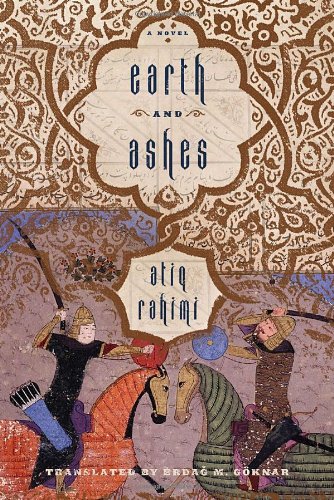25 Feb / Earth and Ashes by Atiq Rahimi, translated by Erdağ M. Göknar

 With the latest ongoing violence in *fill in the blank here, alas*, Afghan writer Atiq Rahimi’s tight, sharp novella is a timely reminder of how the highest price of war is paid by innocent bystanders who by some luck escape death, but are mired in eternal suffering. The Kabul-born Rahimi, who won France’s highest literary honor – Le Prix Goncourt – in 2008 with The Patience Stone, fled Afghanistan during the Soviet invasion, escaped to Pakistan, and eventually found political asylum in France. He returned to Afghanistan in 2002 to film an adaptation of his own Earth to Ashes; the film was an Official Selection at Cannes in 2004 and went on to win a number of awards.
With the latest ongoing violence in *fill in the blank here, alas*, Afghan writer Atiq Rahimi’s tight, sharp novella is a timely reminder of how the highest price of war is paid by innocent bystanders who by some luck escape death, but are mired in eternal suffering. The Kabul-born Rahimi, who won France’s highest literary honor – Le Prix Goncourt – in 2008 with The Patience Stone, fled Afghanistan during the Soviet invasion, escaped to Pakistan, and eventually found political asylum in France. He returned to Afghanistan in 2002 to film an adaptation of his own Earth to Ashes; the film was an Official Selection at Cannes in 2004 and went on to win a number of awards.
In 70 short pages, Rahimi captures lifetimes of personal, human agony. The elderly Dastaguir must seek out his son Murad to bring him unbearably tragic news: the Russian army has destroyed their village, killing the extended family. In tow is the only other survivor, Dastaguir’s grandson Yassin, who is Murad’s young son. Shrouded in silence after the violent attack, Yassin does not yet understand that he has gone deaf, and is convinced instead that everyone’s voices have somehow been stolen. His incomprehensible, silent world provides a searing metaphor for surviving war’s atrocities.
Dastaguir and Yassin have stopped temporarily, hoping to catch a ride to the mines where Murad works. Waiting for a passing truck, they meet a kind, gentle shopkeeper who offers tea and a willing ear to listen. Leaving his grandson to the kindness of this wise stranger, Dastaguir ventures toward Murad with a young truck driver, plagued by disturbing visions, desperate to find the best way to tell his son the gruesome truth.
While the novella’s details are specific to the Soviet Afghan War, the story is clearly, purposefully made universal by Rahimi’s use of the second person for narration – “You close your eyes and weep quietly within.” We readers are both participants and witnesses, and as such, are held responsible for both the destruction and prevention of war. For the sake of today’s survivors, we must somehow figure out once and for all how to choose peace every time.
Readers: Adult
Published: 2002 (United Kingdom), 2010 (United States via Other Press)
